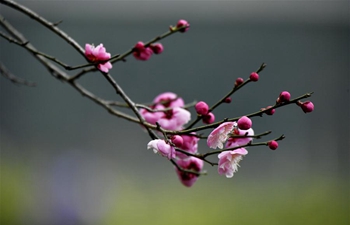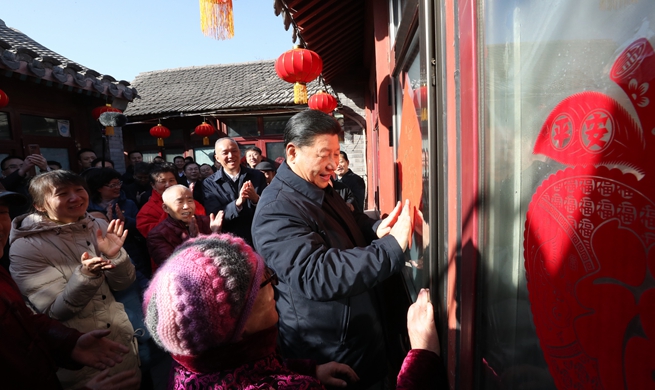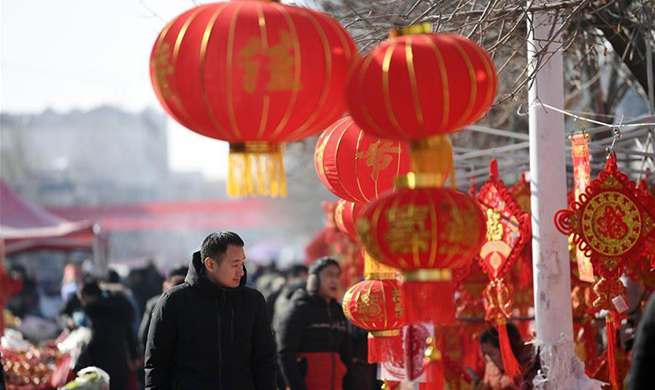by Murad Abdo
ADEN, Yemen, Feb. 1 (Xinhua) -- Yemen's warring factions began preparations for a fresh escalation of fighting raging over the control of the strategic Red Sea port city of Hodeidah, ignoring efforts aimed at cessation of hostilities.
The calls for an escalation in fighting between the Iranian-backed Houthi rebels and Yemeni government forces added angers to the agreement reached under the auspices of the United Nations in Sweden in December last year.
Senior leaders of the Houthi group based in Sanaa vowed to intensify military battles against the Saudi-led coalition and its local allies just in case the implementation of Sweden agreement failed.
Mohammed Ali al-Houthi, head of the Houthi highest revolutionary committee, said in a statement posted in Twitter that capturing the strategic port city of Hodeidah will not be easy for the Saudi-backed government forces.
He added that his group informed the UN envoy to Yemen Martin Griffiths that "reopening roads to the Red Sea Mills will be conducted only when circumstances are appropriate and the situation is safe."
These calls for military confrontations renewed just one day following the departure of the UN envoy who conducted a series of meetings with Houthi leader in Sanaa during the past few days.
Officials confirmed to Xinhua that Griffiths did not succeed in convincing the Houthi leaders to withdraw their forces from Hodeidah and implement Sweden's agreement.
"The Houthis refused to hand over the management of Hodeidah's port to the government authorities and strongly opposed entry of forces loyal to Saudi Arabia-led coalition," an official said.
The official said that the Houthi leaders avoided discussing Hodeidah's issue with the UN envoy and started to talk about halting the war against Yemen and other unrelated topics.
Yemeni observers believed that renewing of the armed confrontations between the two warring sides in Hodeidah will probably take place during the upcoming days, as the ground situation indicates start of escalation.
Yahya Abu Hatem, a strategic military expert, said that the Yemeni government forces backed by the Saudi-led coalition are obliged to use military force just to lead the Houthis into implementing Stockholm's agreement about Hodeidah.
"Resumption of aerial bombardment will definitely make Houthis rush for implementing the Stockholm agreement instead of wasting time," he said.
He added that "Houthis repeatedly refused to accept withdrawal from Hodeidah without fighting and continued in launching attacks in Hodeidah despite the UN observation."
Anwar Gargash, the United Arab Emirates (UAE) minister of state for foreign affairs, said in a series of tweets that the deal reached between the Yemeni warring sides in Stockholm is at critical juncture due to ongoing violations by the Houthis that threaten the overall political process.
The UAE minister said in his statement that "the Saudi-led coalition prepared to use more calibrated force to prod Houthi in compliance with Stockholm agreement."
A humanitarian officer confirmed to Xinhua that the Houthis did not allow reopening roads to transfer humanitarian aids stored at warehouses in Hodeidah to other areas that are in pressing need for food supplies despite the ongoing cease-fire.
On Thursday, the UN's special Yemen envoy wrapped up separate visits with leadership of the two warring parties and expressed concern about the recent fighting, calling for de-escalation and "utmost restraint."
Special envoy Martin Griffiths "expressed concern about recent hostilities in Yemen and called on all parties to exercise utmost restraint and de-escalate tensions, in Hodeidah and in other parts of Yemen," Stephane Dujarric, spokesman for the UN chief, said in a note to press.
UN Secretary-General Antonio Guterres on Thursday appointed the Danish lieutenant general Michael Anker Lollesgaard as head of the United Nations Mission in support of the Hodeidah Agreement to succeed retired Major General Patrick Cammaert of the Netherlands, who led the advance team in Hodeidah.
Abdul-Raqeeb Hidyani, a writer and political analyst, said that the recent tense situation is clearly indicating that fighting will resume in Hodeidah despite the UN intervention in the city.
He said that appointing a new leader for the UN cease-fire monitoring team instead of General Patrick Cammaert won't help in ceasing the calls for escalation of fighting in Hodeidah.
"The new commander for the cease-fire monitoring team won't bring anything new because factors that led to Cammaert's failure are still existing," he said.
The conflict in Yemen started in 2014 when the Houthi rebels overtook the capital Sanaa and forced the government to exile to Saudi Arabia. Since 2015, a Saudi-led coalition, backing the government, has been fighting the Houthis.
The security situation was further exacerbated after the coalition in June 2018 launched an operation to retake rebel-held Hodeidah, a strategic port city that had been handling some 70 percent of Yemen's imports of food.
The fighting has spawned the world's worst humanitarian crisis and brought the poorest Arab country to the brink of famine.
Under the UN auspices, the warring parties reached a deal in Sweden in December 2018, which included a governorate-wide cease-fire of Hodeidah and the formation of the RCC to monitor withdrawal of troops by both the government and the Houthis in the area.
Shortly after, the UN Security Council authorized an advance team for 30 days to monitor and support the implementation of the deal.
Earlier in January, the Security Council adopted a resolution to establish a UN political mission for an initial period of six months to support the Hodeidah agreement.

















